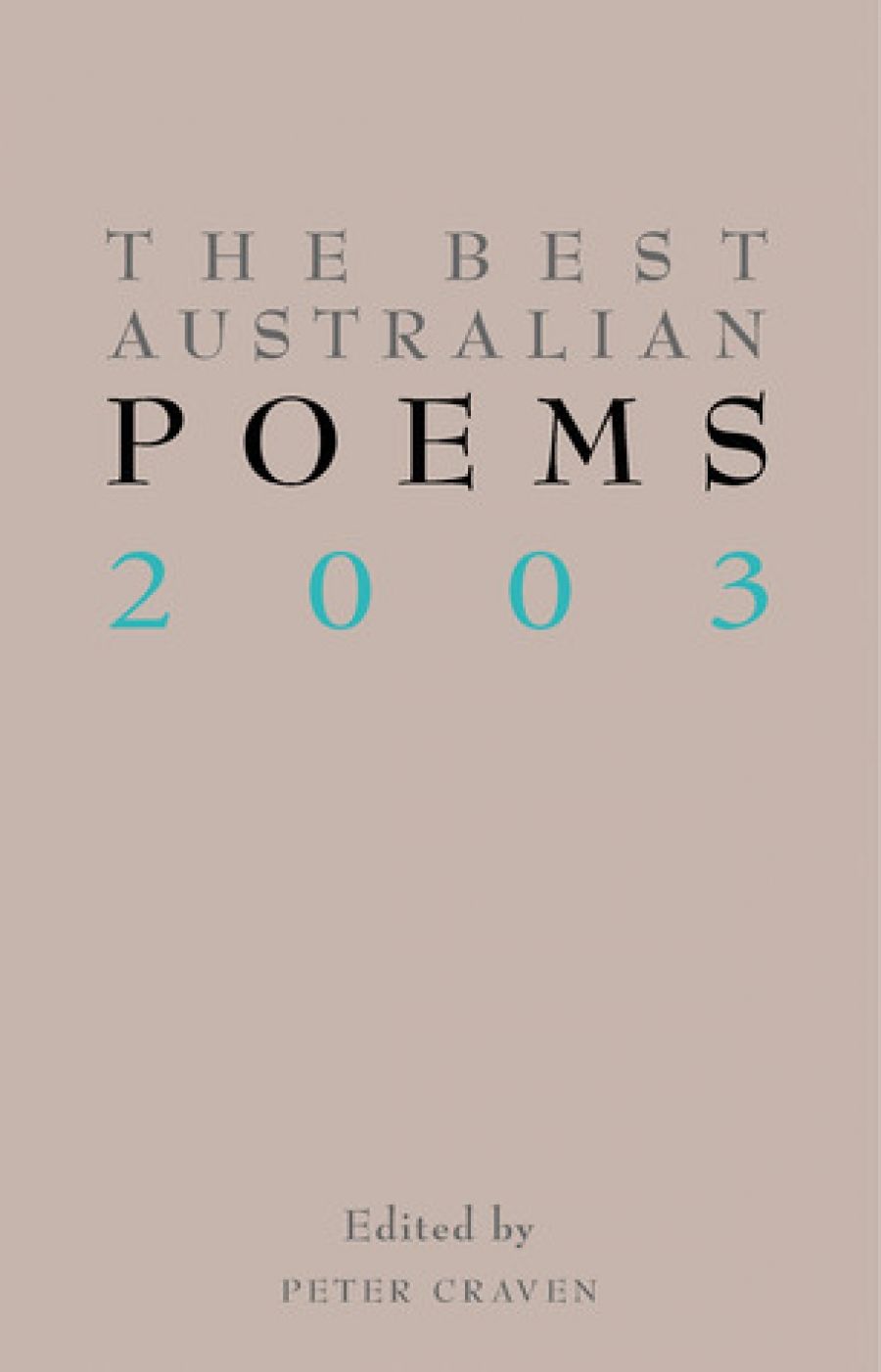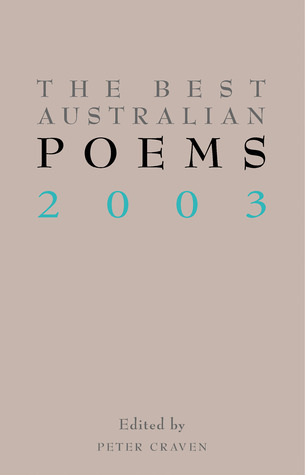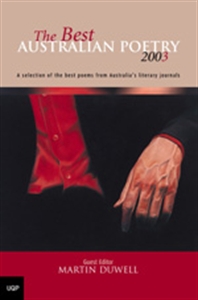
- Free Article: No
- Contents Category: Poetry
- Review Article: Yes
- Article Title: Dead Certs
- Online Only: No
- Custom Highlight Text:
Writing this on the first Tuesday in November, I am struck by how different contemporary Australian poetry is from the Melbourne Cup. There is no money in poetry, of course, and in horse racing everyone, even the horses, are much better dressed. What’s more, despite complaints to the contrary, the returns are usually better when it comes to reading poetry than spending your days at the TAB. Martin Duwell’s The Best Australian Poetry 2003 and Peter Craven’s The Best Australian Poems 2003 are dead certs, compared to the boundless unreliability of horses.
- Book 1 Title: The Best Australian Poems 2003
- Book 1 Biblio: Black Inc., $29.95 pb, 383 pp
- Book 1 Cover Small (400 x 600):

- Book 1 Cover (800 x 1200):

- Book 2 Title: The Best Australian Poetry 2003
- Book 2 Biblio: University of Queensland Press, $22 pb, 141 pp
- Book 2 Cover Small (400 x 600):

- Book 2 Cover (800 x 1200):

The UQP series inaugurated under Martin Duwell’s guest editorship is comparable in format to the long-running American series of a similar name: one poem per poet; each poem previously published in a magazine or newspaper. Duwell’s introduction shows a refreshing lack of angst about the status of poetry, and his choice of poems is impressively catholic. He likes, he says, ‘the linguistically intense’ and lists (‘Bare lists of words,’ as Emerson put it, ‘are found suggestive to an imaginative … mind’), and he is ‘increasingly attracted by emotional statements’. He also likes poems that are ‘built out of individual, often disjunctive, blocks into a whole’.
This allows for very different poets to rub shoulders. Duwell is also unafraid of poems that use words like ‘epic’ and ‘beauty’ (the attraction to rhetorical richness can also be seen in Craven’s collection). The poems themselves in The Best Australian Poetry 2003 are, as the title suggests, almost all good. Of the forty of them, a few do nothing for me, as one would expect, but at least a quarter of the book is extraordinarily powerful.
Only three poems (by Robert Adamson, Geoffrey Lehmann and Peter Porter) also appear in Craven’s anthology. Of the poems that appear only in Duwell’s anthology, the strongest for me is Stephen Edgar’s ‘Eighth Heaven’. To describe the poem as a meditation on the poet’s childhood suggests nothing of its weird power, its estranging force. Thanks to the accidents of an alphabetical arrangement, three excellent poems follow Edgar’s: those by Michael Farrell, Philip Hammial and Jennifer Harrison. The last of these, ‘Funambulist’, develops into a marvellously surreal catalogue poem (lists again): ‘I carry one clap of thunder, some shrimps // and a globe, a bag of nails, a carton of crème / a roly-poly of doves.’ Michael Sharkey’s ‘The Advantages of Daughters’ takes the artistry of lists to a new height. Elsewhere, Emma Lew (who wrote one of last year’s best individual collections, Everything the Landlord Touches) continues to amaze with her lyrical oddities (where the ‘individual, often disjunctive, blocks’, can be the individual lines themselves). Poems by Judy Johnson, Bronwyn Lea, Alex Skovron, Norman Talbot, Ken Bolton, Judith Beveridge and Geoff Page are also all excellent.
Unlike Craven’s editorially Spartan anthology, Duwell’s includes statements by the poets about their poems. In some cases (Peter Porter, Clive James), this is amusing and instructive; in others, it’s redundant or simply embarrassing. Such things are to be expected and don’t lessen the attractiveness of the idea. The list of journals in which poems were first published, complete with editors and addresses, is useful, though it’s unfortunate that Ian Britain is erroneously listed as the Editor of Southerly.
In contrast, Craven’s anthology doesn’t even have an index or a proper contents page, but that allows for more poems. Three times the size of Duwell’s anthology, Craven’s contains two fewer poets. Also an inaugural edition, Best Australian Poems 2003 is part of the Black Inc. series of ‘Bests’, and it is a different beast from the UQP series. It includes anything up to twenty pages of work by a chosen poet, and many poems are previously unpublished. It is nothing like the snapshot of journal publication that the UQP series is. The chosen poets are also more obviously ‘canonical’ than Duwell’s, ranging from those whose careers started in the 1950s (David Malouf, Peter Porter, Bruce Dawe, Chris Wallace-Crabbe) to the no longer young innovators of the 1970s (John Tranter, Alan Wearne, Dorothy Porter, Gig Ryan), and the ‘younger’, mostly pomo, poets (John Kinsella, Peter Minter, Craig Sherborne, Michael Farrell and Kate Lilley). While highlighting omissions is tendentious, one that strikes me is Laurie Duggan, whose Mangroves was another of the year’s best poetry books.
Craven’s broadly historical introduction does the job (although how did the ‘Generation of ‘68’ become the ‘poets of ‘68’?), and the format of the Black Inc. series allows thematic continuities to become apparent in the year’s poetry. Most notably, Craven argues (in his introduction and his selection) for the poetic importance of the so-called War on Terror (and to a lesser extent Tampa and September 11). Craven’s collection forcefully shows the current vitality of political poetry in Australia. Jennifer Maiden’s sequence on George W. Bush’s administration, ‘George Jeffreys’, is funny, original and darkly hard-hitting. Though different in style, such a combination is reminiscent of Art Spiegelman’s graphic work, In the Shadow of No Towers (2002).
Anyone who feels a little disappointed by what might seem a relatively unsurprising collection of poets in The Best Australian Poems 2003 should read the book: it is nothing less than a marvel. The collection begins strongly with David Malouf’s exact and exacting poems. His ‘7 Last Words of the Emperor Hadrian’ is a tour de force comprising seven translations of Hadrian’s ‘Animula vagula blandula’, each translation more plangent than the last. The poems by John Tranter also show an interest in inventive translation (a peculiarly postmodern form of generating poetic texts, as Duwell suggested in his review of Tranter’s Studio Moon in the November issue of ABR). The energy and intense wit of these poems are neatly expressed in the hilarious beginning of Tranter’s irreverent version of Rilke’s first ‘Duino Elegy’: ‘I hate this place. If I were to throw a fit, who /among the seven thousand starlets in Hollywood / would give a flying fuck?’
Like Tranter, Robert Adamson is clearly writing some of his most important poems of a long career, as seen in poems such as ‘Not a Penny Sonnets’ and ‘The First Chance Was the Last Chance’, a heartbreaking meditation on poetic vocation and desire:
Our eyes locked into endless permission;
this dark gift; why can’t I let go
and be the man in your life, not the one who writes
your name down for the dedication page;
whatever the name, you know who I write for;you know how private, how utterly selfish
the muses are – This is your image,
crafted in the long hours away from you.
On closer inspection, Craven’s choices turn out to have a number of welcome surprises, such as the quietly original Sherborne. The inclusion of Evan Jones (once known as a ‘Melbourne University poet’ and for too long critically invisible) is an inspired editorial decision. The terseness of Jones’s darkly humorous satires balances the prolixity of some of the other poets’ work. Dark humour is also visible in Sherborne’s marvellous evocations of a lost familial domesticity. Indeed, dark humour is present in many of Craven’s choices, especially the poetry of Peter Porter, which habitually mixes the elegiac and the satirical. Sex and the Over-Seventies’, a reprise of one of Porter’s best-known earlier poems, ends to devastating effect: ‘It’s late and you and your body / are alone – keep talking, to delay / having to go upstairs together.’
Porter is not the only non-resident poet in this anthology. Others are Clive James, Kevin Hart and John Kinsella. Kinsella’s poems here are, even for those familiar with his work, something of a revelation. The troping of Australian place with violence and a kind of austere aestheticism has rarely been more powerfully figured in his productive career.
Of course, not everything in The Best Australian Poems 2003 is so powerful. Some choices seem odd to me, and the book does have its tendentious moments. Alan Gould’s poem on guilt, for instance, ends: ‘Guilt by proxi’s what guilt trips extend to. // I’ve hurt no black man nor do I intend to.’ Obviously, the war poems mentioned earlier offer the most divergent of responses. (Poetry, after all, is not a division bell.) Bruce Dawe gives the most straightforward and, for me, least successful renderings. ‘Umm Qasr’ concludes: ‘and when we leave we know Fedayeen will / exact revenge on those whose hands we’ve shaken // (yet we did not come to torture, maim, or kill, / but to give new hope to those who felt forsaken).’ This may have force in describing some of the work of individual servicemen and women, but as an account of the Coalition of the Willing’s presence in Iraq, it seems either simple-minded or optimistic.
With well over a dozen poems dealing with the war, one of the best is also the most oblique: Clive James’s ‘Where the Sea Meets the Desert’. In Peter Minter’s case, the subject of war produces a moving and effective lyricism in the face of ‘a rumour / swelling with a thousand seeds, a trace /of thousands of the coming dead’. For me, the most effective of these poems – ‘Moment in the Sun: A Georgic’ – is the quietest, and as such it is perhaps unexpected that it comes from John Kinsella. Writing from the US, the poet witnesses war again as a rumour, ignored but not ignorable: the shadows won’t go away ‘no matter how bright / the sun’.
One might list at length marvellous poems in this collection: Peter Steele’s poem on Christopher Smart, Peter Minter’s ‘Super Georgic’, Kate Lilley’s ‘Collegiate’, Geoffrey Lehmann’s continuation of his ‘Spring Forest’ cycle, Alan Wearne’s original re-creations of Australian suburbia, Bruce Beaver’s ‘Some Night Thoughts’. Not everything here will please, but Craven has collected more good poems than one could rightly expect to find in one volume. There is no need to choose between either The Best Australian Poetry 2003 or The Best Australian Poems 2003; they are both essential. One can only hope that these series will flourish for many years.
I’m still writing, and the Melbourne Cup is a day old. The name of the winning horse will be remembered by some for years, as in Sherborne’s ‘Brett’s Mum’, set on ‘The day Van der Hum Won the Melbourne Cup’. Most poems, in contrast, are notoriously ephemeral, but some of the poems collected by Duwell and Craven will surely still be read in years to come – those poems that stand out with the clarity and strangeness of a jockey’s silks.


Comments powered by CComment